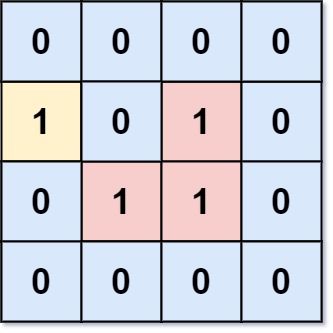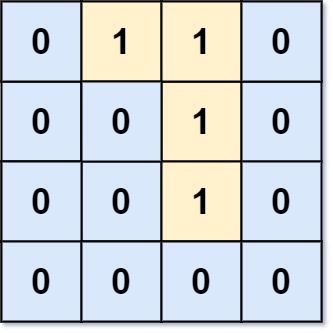Welcome to Subscribe On Youtube
1020. Number of Enclaves
Description
You are given an m x n binary matrix grid, where 0 represents a sea cell and 1 represents a land cell.
A move consists of walking from one land cell to another adjacent (4-directionally) land cell or walking off the boundary of the grid.
Return the number of land cells in grid for which we cannot walk off the boundary of the grid in any number of moves.
Example 1:

Input: grid = [[0,0,0,0],[1,0,1,0],[0,1,1,0],[0,0,0,0]] Output: 3 Explanation: There are three 1s that are enclosed by 0s, and one 1 that is not enclosed because its on the boundary.
Example 2:

Input: grid = [[0,1,1,0],[0,0,1,0],[0,0,1,0],[0,0,0,0]] Output: 0 Explanation: All 1s are either on the boundary or can reach the boundary.
Constraints:
m == grid.lengthn == grid[i].length1 <= m, n <= 500grid[i][j]is either0or1.
Solutions
-
class Solution { private int m; private int n; private int[][] grid; public int numEnclaves(int[][] grid) { this.grid = grid; m = grid.length; n = grid[0].length; for (int i = 0; i < m; ++i) { for (int j = 0; j < n; ++j) { if (grid[i][j] == 1 && (i == 0 || i == m - 1 || j == 0 || j == n - 1)) { dfs(i, j); } } } int ans = 0; for (var row : grid) { for (var v : row) { ans += v; } } return ans; } private void dfs(int i, int j) { grid[i][j] = 0; int[] dirs = {-1, 0, 1, 0, -1}; for (int k = 0; k < 4; ++k) { int x = i + dirs[k], y = j + dirs[k + 1]; if (x >= 0 && x < m && y >= 0 && y < n && grid[x][y] == 1) { dfs(x, y); } } } } -
class Solution { public: int numEnclaves(vector<vector<int>>& grid) { int m = grid.size(), n = grid[0].size(); int dirs[5] = {-1, 0, 1, 0, -1}; function<void(int, int)> dfs = [&](int i, int j) { grid[i][j] = 0; for (int k = 0; k < 4; ++k) { int x = i + dirs[k], y = j + dirs[k + 1]; if (x >= 0 && x < m && y >= 0 && y < n && grid[x][y]) { dfs(x, y); } } }; for (int i = 0; i < m; ++i) { for (int j = 0; j < n; ++j) { if (grid[i][j] && (i == 0 || i == m - 1 || j == 0 || j == n - 1)) { dfs(i, j); } } } int ans = 0; for (auto& row : grid) { for (auto& v : row) { ans += v; } } return ans; } }; -
class Solution: def numEnclaves(self, grid: List[List[int]]) -> int: def dfs(i, j): grid[i][j] = 0 for a, b in pairwise(dirs): x, y = i + a, j + b if 0 <= x < m and 0 <= y < n and grid[x][y]: dfs(x, y) m, n = len(grid), len(grid[0]) dirs = (-1, 0, 1, 0, -1) for i in range(m): for j in range(n): if grid[i][j] and (i == 0 or i == m - 1 or j == 0 or j == n - 1): dfs(i, j) return sum(v for row in grid for v in row) -
func numEnclaves(grid [][]int) (ans int) { m, n := len(grid), len(grid[0]) dirs := [5]int{-1, 0, 1, 0, -1} var dfs func(i, j int) dfs = func(i, j int) { grid[i][j] = 0 for k := 0; k < 4; k++ { x, y := i+dirs[k], j+dirs[k+1] if x >= 0 && x < m && y >= 0 && y < n && grid[x][y] == 1 { dfs(x, y) } } } for i, row := range grid { for j, v := range row { if v == 1 && (i == 0 || i == m-1 || j == 0 || j == n-1) { dfs(i, j) } } } for _, row := range grid { for _, v := range row { ans += v } } return } -
function numEnclaves(grid: number[][]): number { const m = grid.length; const n = grid[0].length; const dirs = [-1, 0, 1, 0, -1]; const dfs = (i: number, j: number) => { grid[i][j] = 0; for (let k = 0; k < 4; ++k) { const x = i + dirs[k]; const y = j + dirs[k + 1]; if (x >= 0 && x < m && y >= 0 && y <= n && grid[x][y] === 1) { dfs(x, y); } } }; for (let i = 0; i < m; ++i) { for (let j = 0; j < n; ++j) { if (grid[i][j] === 1 && (i === 0 || i === m - 1 || j === 0 || j === n - 1)) { dfs(i, j); } } } let ans = 0; for (const row of grid) { for (const v of row) { ans += v; } } return ans; } -
impl Solution { fn dfs(grid: &mut Vec<Vec<i32>>, y: usize, x: usize) { if y >= grid.len() || x >= grid[0].len() || grid[y][x] == 0 { return; } grid[y][x] = 0; Solution::dfs(grid, y + 1, x); Solution::dfs(grid, y, x + 1); if y != 0 { Solution::dfs(grid, y - 1, x); } if x != 0 { Solution::dfs(grid, y, x - 1); } } pub fn num_enclaves(mut grid: Vec<Vec<i32>>) -> i32 { let mut res = 0; let m = grid.len(); let n = grid[0].len(); for i in 0..m { Solution::dfs(&mut grid, i, 0); Solution::dfs(&mut grid, i, n - 1); } for i in 0..n { Solution::dfs(&mut grid, 0, i); Solution::dfs(&mut grid, m - 1, i); } for i in 1..m - 1 { for j in 1..n - 1 { if grid[i][j] == 1 { res += 1; } } } res } }